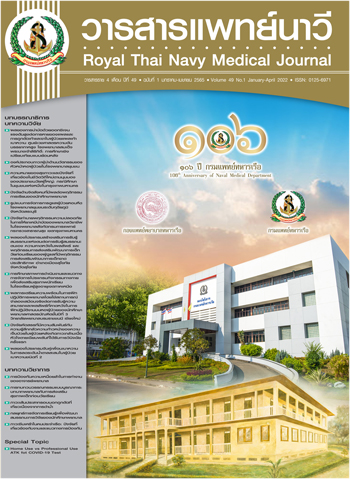Effects of Using Simulation-based Learning for Perceived Self-efficacy and Outcome Expectations Performing Hospital Nursing Care in of Third year Nursing Students in Boromarajonani College of Nursing, Chiang Mai
Main Article Content
Abstract
Abstract
Using Simulations Based Learning (SBL) is a process for support student nurses to action their roles and participation in SBL scenarios that helpful to learning and nursing skills training before performing nursing care in hospital. The aimed of this Quasi-experimental research using one-group pretest-posttest design was to examine effects of Simulation-based Learning for perceived self-efficacy and outcomes expectation in performing nursing care in hospital of 75 third year nursing students in Boromarajonani of Nursing College Chiang Mai. Research instruments included SBL scenarios, questionnaires for examining student’s perceived self-efficacy and student’s outcome expectations. Data analyzed by using frequency, mean, standard deviation (SD) and paired t-test.
The results showed that after intervention the sample groups had significantly statistically higher average score of perceived self-efficacy and outcomes expectation than before intervention (p < .001).
The findings should promote using SBL to preparing and developing nursing skills for student nurses. The study also recommends to study using SBL for clinical skills competence of nursing students and develop a variety of complex or specific SBL scenarios.
Article Details

This work is licensed under a Creative Commons Attribution-NonCommercial-NoDerivatives 4.0 International License.
References
Onsri P. An instructional model for enhancing skills among Army nursing students. Journal of The Royal Thai Army Nurses 2018;19(3):147-57. (in Thai).
INACSL Standards Committee. INACSL standards of best practice: simulationSM facilitation. Clinical Simulation in Nursing 2016;12:S16-S20.
INACSL Standards Committee. INACSL standards of best practice: simulationSM debriefing. Clinical Simulation in Nursing 2016;12:S21-S25.
Sinthuchai S, Ubolwan K. Fidelity simulation-based learning: implementation to learning and teaching management. Journal of The Royal Thai Army Nurses 2017;18(1):29-38. (in Thai).
Kumkong M, Leejareon P, Aramrom Y, Jitviboon A. Effects of simulation-based learning on perceived self-Efficacy in providing nursing care for advanced life support to patients with critical illness or emergency condition among nursing students. The Southern College Network Journal of Nursing and Public Health 2016;3(3):52-64. (in Thai).
Tantalanukul S, Rattanasak S, Sengpanich C, Srisung W, Tungkawanich T. The effect of simulation-based learning on the ability development of primary medical care practicum of nursing students at Boromarajonani College of Nursing Uttaradit. Boromarajonani College of Nursing, Uttaradit Journal 2016;8(1):49-58. (in Thai).
Bandura A. Self-efficacy: the exercise of control. New York: W.H. Freeman and Company; 1977.
Thamnamsin K, Punyapet K, Noitung S, Artsanthia J. The effect of teaching simulation-based learning program to the knowledge in basic medical care of nursing students. Journal of The Royal Thai Army Nurses 2018;19(Suppl Issue 2):80-8. (in Thai).
Prakas N, Sombutboon J, Khanwiset S. Development of a simulation-based learning model for encouraging perceive self-efficacy in utilizing nursing process among nursing students at Phrapokklao Nursing College Chanthaburi. Journal of Phrapokklao Nursing College 2019;30(1):200-15. (in Thai).
Julsiri A, Chuenklin T, Pheetarakorn P, Kaewraya K. Effects of simulation-based learning on self-efficacy of nursing student in advanced cardiac life support skills. Journal of Community Public Health 2020;6(3):109-22. (in Thai).
Chaiyarit A. The effects of the simulation-based learning program on levels of stroke knowledge among the 3rd year nursing students at Boromarajonani College of Nursing, Pra-Putthabat. The Southern College Network Journal of Nursing and Public Health 2019;6(Special Issue):59-68. (in Thai).
Hsin-Hsin L. Effectiveness of simulation-based learning on student nurses' self-efficacy and performance while learning fundamental nursing skills. Technology and Health Care 2016;24(s1):369-75.
Kolb DA. Experiential learning: experience as the source of learning and development. Englewood Cliffs: Prentice Hall; 1984.
Mohamed SA, Fashafsheh IH. The effect of simulation-based training on nursing student’s communication skill, self-efficacy and clinical competence for nursing practice. Open Journal of Nursing 2019;9:855-69.
Kraturerk W, Benjakul S, Kengganpanich M, Kengganpanich T. The effects of the smoking cessation program applying the social cognitive theory among Naval rating students at Naval Education Department, Royal Thai Navy. Royal Thai Navy Medical Journal 2020;47(2):317-39. (in Thai).
Rasrikrit P, Choowattanapakorn T. The effects of self-efficacy promotion combined with family support program on physical activity in older persons with coronary artery disease receiving percutaneous coronary intervention. Royal Thai Navy Medical Journal 2019;46(3):653-68. (in Thai).
INACSL Standards Committee. INACSL standards of best practice: simulationSM simulation design. Clinical Simulation in Nursing 2016;12:S5-S12.
INACSL Standards Committee. INACSL standards of best practice: simulationSM simulation glossary. Clinical Simulation in Nursing 2016;12:S39-S47.
INACSL Standards Committee. INACSL standards of best practice: simulationSM simulation operations. Clinical Simulation in Nursing 2017;13:681-7.
Lertlum L, Tanasansutee C, Panawatthanapisuit S, Bumrungsri C. Development of a simulation-based learning model. The Southern College Network Journal of Nursing and Public Health 2019;6(Special Issue):43-58. (in Thai).
Wisawatapnimit P, Suttineam U, Kiatseesakul J. Effect of simulation-based learning model for nursing practicum preparedness for patients with congestive heart failure on students’ satisfaction and self-confidence in learning of the third-year nursing students, Boromarajonani College of Nursing Bangkok. Journal of Health and Nursing Research 2019;35(2):224-34. (in Thai).
Suwannakeeree W, Jullmusi O, Inkaew T, Tangkawanich T, Rueangram S. Satisfaction and self-confidence in critical care nursing of nursing students learning with simulation-based learning. Journal of Nursing and Health Sciences 2017;11(3):167-77. (in Thai).
Zapko KA, Marry L, GF, Blasiman R, Shelestak D. Evaluating best educational practices, student satisfaction, and self-confidence in simulation: a descriptive study. Nurse Educ Today 2017;60:28-34.
Lee BO, Liang HF, Chu TP, Hung CC. Effects of simulation-based learning on nursing student competences and clinical performance. Nurse Education in Practice 2019;41:1-7.
Zakari NM, Hamadi HN, Audi GR, Hamadi W. Impact of simulation on nursing student’s competency: a perspective qualitative study in Saudi Arabia. International Journal of Nursing Education 2017;2(9):75-80.

